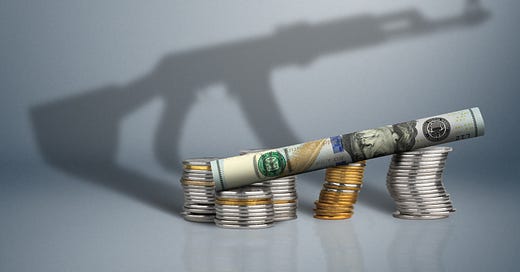Welcome to Yaka Stuff, our weekly newsletter that covers news, industry perspectives, and updates from the Hard Yaka ecosystem. Check out our last report here.
This week:
How Tether fuels the financial underworld
Greg Kidd chats with Andrew Yang
Stuff happens
1. How Tether fuels the financial underworld’
The world of crypto can sometimes seem like a solution looking for a problem, while lacking in proper user cases. But crypto’s first killer application was actually developed 10 years ago—when Tether launched the first U.S. dollar-backed stablecoin. Today, Tether has $120 billion in assets and is more profitable than BlackRock with less than 100 employees.
The only issue? As the WSJ reports, one of its main use cases is bypassing U.S. sanctions:
Known as a stablecoin for its 1:1 peg to the dollar, tether gained early use among crypto aficionados. But it has spread deep into the financial underworld, enabling a parallel economy that operates beyond the reach of U.S. law enforcement.
Wherever the U.S. government has restricted access to the dollar financial system—Iran, Venezuela, Russia—tether thrives as a sort of incognito dollar used to move money across borders.
Russian oligarchs and weapons dealers shuttle tether abroad to buy property and pay suppliers for sanctioned goods. Venezuela’s sanctioned state oil firm takes payment in tether for cargoes. Drug cartels, fraud rings and terrorist groups such as Hamas use it to launder income.
Naturally, Washington is concerned:
With sanctions, Washington can cut adversaries off from the dollar and thus much of the global trading system, since all dollar transactions involve U.S. regulated banks. Tether’s popularity subverts those powers.
“We need a regulatory framework that doesn’t allow offshore dollar-backed stablecoin providers to play by a different set of rules,” Deputy Treasury Secretary Wally Adeyemo told The Wall Street Journal. Adeyemo singled out tether in April testimony before Congress.
But it’s not all bad.
For some, Tether is a way to protect themselves from their leaders’ financial mismanagement. For others, it’s an opportunity to build and create value:
Yet in dysfunctional economies such as Argentina and Turkey, beset by hyperinflation and a shortage of hard currency, tether is also a lifeline for people who use it for quotidian payments and as a way to protect their savings.
…
Ardoino, the Tether CEO, visited Georgia last year and approached government officials with an offer to help expand the local crypto economy. They signed a cooperation deal that Ardoino said would make the former Soviet republic a flourishing payments hub. Tether invested $25 million in local startups, according to Georgia’s innovation agency.
The main recipient of Tether’s financing, CityPay.io, has rolled out tether-payment systems for thousands of Georgian businesses. Hotels including Tbilisi’s downtown Radisson Blu Iveria have CityPay point-of-sale terminals, and it has joined with a property venture there to sell premium apartments in tether.
CityPay also facilitates international payments in tether for companies, totaling as much as $50 million a month, according to Eralp Hatipoglu, its Turkish CEO. He said the pressure the U.S. applied on the global banking system created these opportunities. Companies exporting from Turkey to Georgia get hammered with questions from correspondent banks, he said, and wire transfers take days.
Tether’s dual nature is most stark in Venezuela, where it helps corrupt officials be more corrupt but serves as a symbol of hope for its downtrodden citizen:
President Nicolás Maduro’s government was under siege in 2020 from U.S. measures that targeted state oil firm Petróleos de Venezuela, or PdVSA. That October, Maduro’s parliament passed an “Anti-Blockade Law” that authorized the government to use crypto to protect its transactions.
PdVSA began demanding payment for oil shipments in tether, according to people familiar with its activities and transaction records. Purchase orders authorized by PdVSA often instructed buyers to transfer tether to a certain wallet address. Another method was for intermediaries to swap deliveries of cash for tether and load the tokens onto prepaid travel cards, which enabled holders to use crypto for purchases.
The company’s adoption of tether was so pervasive it had another effect: instead of sending oil revenues back to the government, the middlemen that PdVSA used for the sales diverted funds for themselves, leading to a scandal that toppled the oil minister.
“This cryptocurrency’s use only has served to perpetuate gigantic levels of corruption,” Rafael Ramírez, a former oil minister under Maduro, said in an interview.
…
For regular Venezuelans, tether became a lifeline, too. Inflation that reached 2 million percent wiped out savings held in bolivars. Currency controls made bank transfers abroad impractical.
Guillermo Goncalvez, a 30-year-old Caracas graduate, runs a platform called El Dorado that offers Venezuelans peer-to-peer tether trading, which links buyers and sellers directly.
El Dorado has over 150,000 users, who pay fees that are a fraction of what traditional money remitters charge: local stores converting daily revenues into tether, Venezuelan migrants sending money back to families, and freelancers receiving salaries in USDT, as tether is also known.
“USDT is the digital dollar for all Venezuelans,” Goncalvez said.
That dual nature is ultimately the story of Tether. It’s clear that digital dollars have huge potential for good.
The next step is to figure out the bad.
Relevant
U.S. Consumers Say Crypto Is Here to Stay, Stablecoins Maybe Not: Deutsche Bank
Tether USDT’s market share rises 20%, reaching 75% in two years
Circle predicts stablecoins will become mainstream global payment method
Visa: Stablecoin Fosters US Dollar Dominance in Emerging Markets
2. Greg Kidd chats with Andrew Yang
In this episode, Andrew interviews Greg Kidd, an independent candidate running for Congress in Nevada's 2nd District. Kidd's rich background in tech and fintech makes him a prime independent source to discuss how bipartisan collaboration can break political gridlock. Kidd emphasizes the importance of regulatory clarity for innovation, particularly in emerging industries. Highlighting Nevada’s vast lithium reserves, crucial for electric vehicle production, Kidd advocates for policies that ensure sustainable economic development while addressing healthcare, women's rights, and the need for political independence from traditional party lines.




